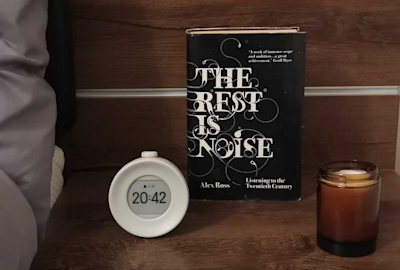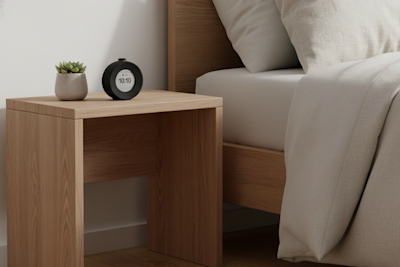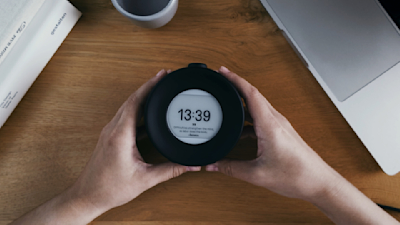
I went 24 hours without my phone and here’s what happened
This is a guest post by Laura DiBiase. Laura is a Marketing Specialist for Perfect Gym Software. She is a native-born Los Angelenos who relocated to Warsaw, Poland two years ago. She spends most of her time at the gym, on an airplane, or online shopping. She committed to 24 hours without her smartphone and here's what she discovered.
Like many other millennial females from Los Angeles, I am very self-aware that I spend too much time on my phone. If I didn’t know before, recent iPhone updates have made what I call “screen-shaming” a part of my Sunday routine when it unsolicitedly sends me my weekly screen-time report:
Weekly Screen Time report
These numbers astounded me, and I even sought to prove there was some kind of calculation error (there wasn’t). I follow the golden rules of socially permissible phone use: no phones during social outings, shared meals, and “concealed” use at work, etc.
However, if left to my own devices (pun intended), I can easily spend hours rotating between refreshing my Instagram story views, spamming my friends with Reddit memes, and lurking my ex-boyfriend's cousin's best friend's newborn baby.
Turns out, my excessive phone use is much more the norm than the exception. The average American reportedly spends 70 hours on their phone per month, with younger adults consistently logging more than 94 hours per month.
So, half incentivized by personal shame and half to prove to myself that I could: I committed to 24 hours without my smartphone. For good measure, I also committed to a complete social media lock out from all my accounts except my work email.
Here’s a play by play of what happened.
Initial Response: I was super bored
Like, concerningly bored.
Within my first phoneless hour, I immediately realized how reliant I am on my phone for a continuous steady stream of stimulus and entertainment. I became legitimately anxious not being able to start morning cycling through my social media routine: Email, Instagram, Facebook, Reddit, etc. I felt unsettled not being able to check the time or weather or any other arbitrary fact about the day as I headed to the bus stop.
My 40 minute commute felt like two hours with no distractions or Spotify playlist to override the cheerful sounds of Warsaw morning traffic. In addition to a latent sense of anxiety, I felt extremely, and I’d imagine visibly uncomfortable. Like, you know when social anxiety makes you feel like you don’t know what to do with your hands, so you nervously play with your hair or fidget with your fingers? Without my phone, I candidly did not know what to do with myself besides stare out the window to try to avoid eye contact hoping my bus would move faster.
Realization 1: Phantom Phone Reflex is a Real Thing
Arriving to work temporarily quelled my burning need for stimuli, but that didn’t stop me from constantly autopiloting to reach for my phone. In fact, throughout the entire work day, I found myself unconsciously searching for my phone without realizing what I was doing it. The reflex was intuitively confusing: I had my computer under my fingertips which could accomplish anything I wanted to on my phone, yet my compulsion was still there.
My Pavlovian phone checking instinct slowly diminished over the day, but never completely disappeared. In fact, I realized that whenever I was alone, my phantom phone reflex was strongest, even inevitable. In addition to subconsciously looking for my phone, I swear I could occasionally feel it vibrating in my purse.
Realization 2: My Phone is My Security Blanket
I know it sounds dramatic, but not having my phone made me feel vulnerable. As an expat living in a country where I struggle to speak the language, my phone is usually my first line of defense to avoid any kind of confrontation. Confrontation may be the wrong word, but if someone on the bus or at the supermarket taps me on the shoulder for a simple question, I am still embarrassed that my Polish is not strong enough to respond. As a result, living with earphones in and my face buried in my phone has become my normal for any time I am alone in public.
Without my phone or headphones to make myself as unapproachable as possible, I felt too exposed. At first, I made concentrated efforts to avoid eye contact or to distance myself from anything that could risk an encounter.
However, as I became more engaged with my surroundings, my fear of these “uncomfortable” interactions lessened. When I inevitably had a small public run-ins, they were unsurprisingly nowhere close to as uncomfortable as I had played them up in my head. As the day went on and I gradually felt more comfortable without my phone, the more I could appreciate not having it.
Realization 3: My Phone Is My Brain’s AutoPilot
Going hand in hand (so to speak) with using my phone as my safety mechanism, 24 hours without it revealed how much I rely on my phone to think for me. In addition to fighting the urge to google whatever obscure fact popped into my mind, not having my phone forced me to plan my day much more conscientiously.
My phone’s calendar usually vibrates every other hour to remind me about work meetings, appointments, to-do lists, or plans I committed to without necessarily confirming my availability. Admittedly, I have a horrible habit of committing to plans and do not think about them again until I am reminded the day of, which can often lead to me cancelling them. Not having my phone forced me to be more responsible with my commitments as well as cognitively aware.
Without the ability to research store hours, instantly map directions or coordinate through instant communication, I felt much more proactive to actually plan my day instead of haphazardly falling through it. I also felt more engaged with my daily activities, whether it be giving my full concentration to work assignments or conversations.
Realization 4: I Don’t Have Insomnia, I Have a Smartphone
Even though cutting down on screen time before my bed has been my new years resolution since 2012, it seldom actually happens. We’ve all heard the scientific studies corroborating how blue light emitted from screens disrupts our sleep cycles and subsequently, our mood and energy levels. Similar studies attribute just as detrimental emotional side effects from checking our phones first thing in the morning.
In addition to not having the temptation to scroll through Instagram while lying in bed, I swear my brain was more exhausted than usual by bed-time. My completely unprofessional self-diagnosis was that my brain was extra tired from thinking for itself all day instead of letting my phone do the heavy lifting for me. With no screens, I fell asleep quicker and did not wake up in the middle of the night like I typically do.
Realization 5: The Most Anti-Climactic End of 24 Hours Ever
After my metta day and great night of sleep, my phone compulsion proved stronger than any “live-in-the-moment” lessons I thought I learned within 24 hours. As soon as I woke up I literally jumped out of bed to check my phone, anxiously waiting to catch up on a days’ worth of notifications, headlines, and dog memes.
Apart from the dopamine that probably coursed through my body when powering my phone on, the results were extremely underwhelming. I had no urgent messages, life-changing apocalyptic tweets, or sudden influx of Instagram followers waiting for me. The most exciting thing I had waiting for me was a slew of group chat messages that were way more work to scroll through than they were to read. The disappointing results of my anticipation was the final embarrassing gut-punch I needed to conclude this 24 hour experiment.
My Overall Experience: Not Great, Not Terrible
In a mere 24 hours, I completely understand how initiatives pushing disconnecting and digital-free wellbeing will be crucial moving forward. 24 hours was more than enough for me to see that my own smartphone habits and literal dependency are an immediate issue I need to improve. For example, I never realized how much using my smartphone for anything easily snowballs into indefinitely glaring at my screen. Every part of my day could somehow need an application: ordering lunch on Uber Eats, logging my workouts through my gym software app, or buying a bus ticket instead of walking to the ticket dispenser. Simply checking a text message or changing a song somehow turns into me opening eight different applications instead of putting my phone down after I respond.
What I initially perceived as phoneless boredom turned out to not be as negative as I thought: I was present. I actually allowed my mind to wander freely instead of using my phone to subconsciously guide my thoughts, which made me consider small details of my day I usually gloss over. I noticed the people around me on my bus ride home as distinct faces instead of general mess of crowded bodies. I appreciated the unseasonably good weather for Warsaw in mid-October and felt weirdly liberated just appreciating the sunshine instead of needing to check my phone to know the exact temperature in Celsius and Fahrenheit.
On the other hand, even after my 24 hour detox and resulting awareness that I need to build a better phone habits, I am not jumping on the “completely ditch technology” bandwagon. I do not think utilizing our smartphones to their best capabilities is necessarily a bad thing. Used responsibly, many of my phone’s functions genuinely make my day easier or make me better.
While I am personally not willing to abandon my smartphone, I am ready to address my habits. I encourage everyone to try to last the 24 hour phoneless challenge to see if they feel the same!
Related stories

Mudita’s Community-Curated Wintertime Reading List
Slow down this winter with our community-curated reading list from the Mudita Forum Community, featuring books on well-being, focus, simplicity & mindful tech.

Is 8 hours still the golden rule for sleep?
Eight hours is the recommended average, not a rule. Discover why sleep quality, consistency, and your natural rhythm matter more than hitting a number.

New Mudita Harmony Update: Wake Up Inspired with Custom Quotes
Discover the new Custom Quotes feature in Mudita Harmony & Harmony 2. Personalize your wake-up routine with inspiration that starts your day right.
If you'd like to receive the best stories from our blog, keep up to date with our progress and get notified about our product releases and special discounts.